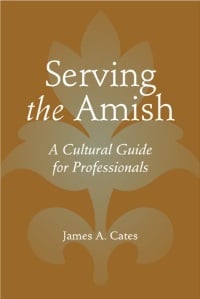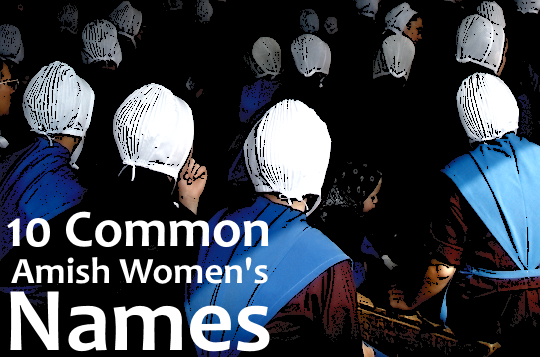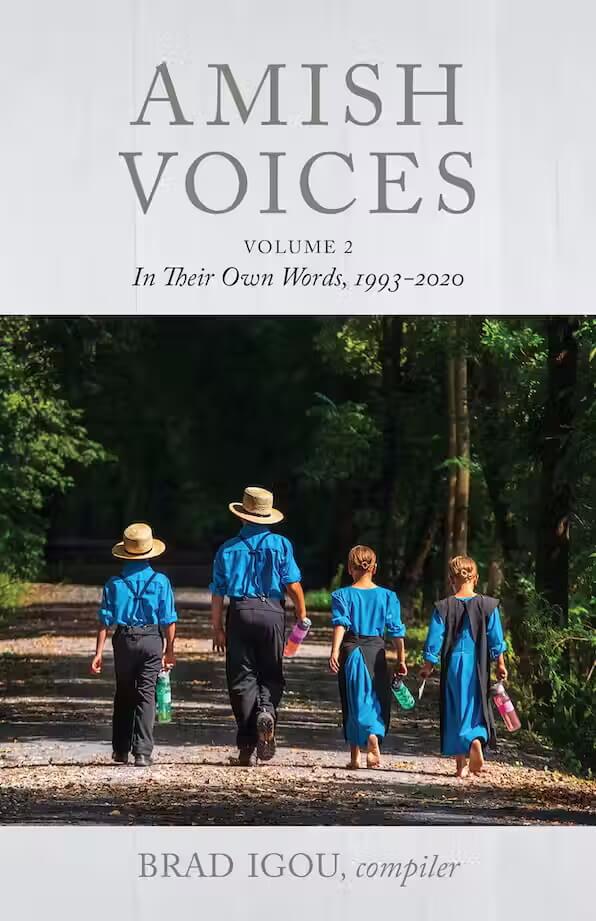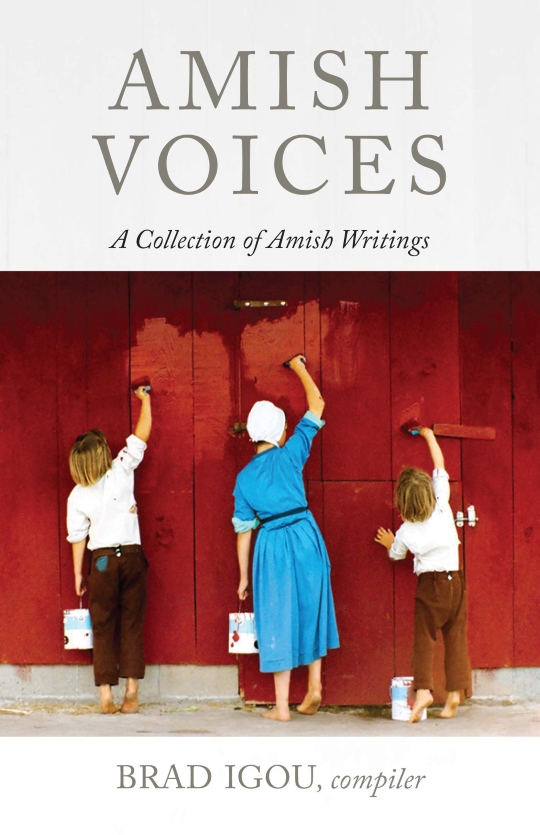James Cates on Serving the Amish
If you missed it, Serving the Amish author James Cates answered your questions in the comments section of our previous post. I’ll share a couple of them here (plus three of my own at the end of this post). First, from Loretta:
Amish often have large families and children are considered a blessing from the Lord. What I haven’t understood is why it is hush-hush when the wife is expecting. We Englishe are anxious to share our news so that others can rejoice with us. For such a natural thing as having a child, why do they wait until they “show” before acknowledging the joyous event?
 Jim’s response:
Jim’s response:
My experience on this is twofold. First, much depends on the settlement. In some areas the pregnancy is announced much earlier than others. Second, when it comes to “news” among the Amish there is what is “known,” and what is “supposed to be known.” Not all that different from those of us who are not Amish, but it seems more strictly enforced in a collective society. So at times I have “known” that a wife was expecting, but did not yet “know” because I was told in deepest secrecy. My impression (although I can’t base this in fact) is that the Amish attitude of reticence toward discussing sexual matters leads to the reluctance to acknowledge another child until a woman is obviously pregnant. That may well be a question Amish readers want to address, and can address better than me!
Kim H asks:
I’m curious if this book covers any areas of hostility from one group to the other, such as dealing with a police officer who has a chip on his shoulder regarding Amish or vice versa.
Jim:
Serving the Amish does not deal with individuals who feel animosity. Too often, individual discomfort with a group is unique to that individual, and represents a personal experience, a mindset passed down by family, or a cultural “norm” that is difficult to change without understanding their personal history. The book does address more general aspects of social misunderstanding. For example, in the Elkhart-LaGrange settlement youth sometimes speak of being stopped by police for “DWA” – “Driving While Amish.” The term is humorous, but refers to the ongoing tension that exists between some law enforcement personnel and Amish youth who feel they are the unfair focus of traffic stops.
Read the rest of the responses here.
Win Serving the Amish
To win a copy of Serving the Amish, leave a comment on this post. We’ll draw and announce a random winner on Friday.
Three More Questions
I asked Jim an additional three questions about his work with the Amish:
What are typical pitfalls in working with the Amish? What are the challenges that are unique to this community, or at the least uncommon or unseen among the English?
First and foremost, the human experience is universal. Every person becomes stressed, depressed, anxious, frightened, and fearful. We all make poor choices and ultimately face the fallout of those poor choices. And – hopefully – we learn from these experiences and become stronger, with a better knowledge of ourselves and the world around us. In that sense the challenges of working with the Amish are no different than working with anyone else.
And yet in parallel the challenges are indeed unique. Mental health counselors, healthcare professionals, social service personnel, law enforcement – any of us who deal with the intimate aspects of people’s live on a routine basis develop a style of doing so. And we develop our timing, rhythm, even a “sixth sense” or intuition about how to handle a given situation based on these interactions as they usually occur. If we are unfamiliar with the Amish, it is all too easy to misread the signs and assume we are successfully meeting a need, only too often to find ourselves feeling like Alice at the Mad Hatter’s Tea Party.
At the risk of mixing metaphors like a food processor, I’ve used this phrase elsewhere, but always and forever, when working with any Plain people there is a line in the sand that we cannot cross. To “be” Amish means not only to embrace a way of life, but to turn one’s back on the world in doing so. The Amish become adept at observing the world while the world observes them – as tourists, in business transactions, in casual acquaintances, and even deeper friendships. When we assume a role in a helping profession however, we also assume the potential to be invasive in a way that other “worldly” interactions do not. As a result, we must remain keenly aware of the vulnerability our role creates and tread lightly – ever so lightly – into a realm in which we are often either uninvited, or at most tentatively welcomed guests.
As I read back over this response I realize it offers little of substance. The problem is that the most unique challenge with this community is the need to listen with the heart, a demand that does not lend itself to practical, hands-on advice. Too often we retreat into our roles: “counselor,” “doctor,” “nurse,” “cop,” and interact professionally from there. The challenge here is the demand to be authentic. Without a genuine person fulfilling the role there is no trust; and without trust, there is no substantive work to be accomplished. The Amish say with sincerity “We don’t care how much you know until we know how much you care.”
How are Amish patients/clients different from mainstream patients/clients?
I would not presume to speak for all Amish service providers, but I can give an opinion based on my experience seeing Amish clients in a variety of settings, and having talked with numerous other professionals as well.
The Amish may have a respect for English professionals, but that respect is tinged with an awareness that these are people of the world. They do not view the advances of science or the wonders of technology with our view. Not only does their education end at the 8th grade, but for those who were taught in Amish schools, the emphasis on science and technology has been more practical, rather than dedicated to the subtle but pervasive belief that science is a panacea that holds the solutions to our global problems.
There is less respect accorded to professionals then, simply by virtue of the fact that they hold advanced degrees or certifications, or a position of authority. It is easy to mistake the general deference or humility that the Amish often portray in interactions with the world as a manifestation of such respect, but it is a humility accorded to all, and not only to those who are in a position of authority.
Another factor plays into their attitude toward illness and emotional distress. The Amish, akin to many fundamental Christian sects, believe in a God who is actively and busily involved in affairs on earth. They view this life as momentary, and eternity as the ongoing, endless presence of the soul, a time that they hope will be spent with God (since it would be a sign of pride to assume salvation). They are therefore more fatalistic about life experiences than those who perceive themselves as more empowered to change the course of events, and place greater emphasis on the importance of the present. Their belief does not override self-preservation or a desire to achieve happiness and a sense of peace in this life, but it can mute these desires in comparison with the mainstream.
How do the Amish view mental health services? Do they perceive a need? How often are services ordered by a court or other entity?
There are probably as many views of mental health services as there are Amish individuals! However these views fall in three broad categories. There are those who believe that “counseling” (their generic term for mental health services) of any type is unnecessary. Jesus is the Counselor, and adherence to the scriptures and a Godly life is the sole requirement to address mental health. Unfortunately, at the extreme such views have led to tragedy when persons with a serious mental illness (such as schizophrenia or a serious Bipolar Disorder) have gone untreated. There are those who believe that counseling has a place, but that counseling should be reserved for Amish counselors or (in some cases) Plain people counselors. And there is a third group who believe that counseling has a place and encourages the use of English counselors.
The attitude toward those with what I would term a Serious and Persistent Mental Illness will sometimes cut across these views. That is, persons who may believe that Jesus is the only necessary counselor, or those who believe in Plain people counselors often still understand the need for psychiatric hospitalization for persons who struggle with a mental illness in which they lose contact with reality, are unable to care for themselves, and need medication to maintain stability.
The Amish also provide residential treatment facilities that are Amish-run. Some are freestanding, served by and for the Amish community. Others partner with community mental health centers and utilize professional staff for a portion of services. These types of services are continuing to evolve and change and the models for service are changing even as I write.
My involvement with the Amish became more in-depth as a result of the effort to provide an alcohol education program for Amish adolescents who were arrested in the Elkhart-LaGrange settlement for offenses related to alcohol consumption, often while driving a motorized vehicle or a buggy. This is the most common charge for which Amish youth (and at times adults) are mandated by the Courts for services.
Some Amish clergy and parents continue to defend the use of alcohol during rumspringa and believe their children are unfairly targeted for arrest during these times. This is an issue that stirs me deeply. In the same way that I do not want to see English drivers on the road endangering either the English or the Amish who share it, I do not want to see the Amish on the road endangering other Amish or the English who share it. I am at a loss as to how some Amish can argue that their children should be allowed to drink and drive, endangering themselves and others, without experiencing consequences when they are caught.







Your book seems very interesting and I would like to read it. I have been an active reader of The Budget newspaper for many years. It seems like in recent years, I read more of Amish people entering nursing homes — for short term care such as rehab stays,
and for long term care, especially for single Amish people who may not have relatives willing and/or able to provide the extensive assistance they may need with intense medical/physical needs. Do you have any information on this?
Amish & Nursing Centers
A good question, and one that I believe varies dramatically. One change is the emphasis on rehabilitation post-surgery in some cases(e.g., knee replacement). It is simply easier to have a patient stay in a nursing center for twice-a-day physical therapy than pay a driver to transport, try to manage in a home with two floors, etc. In regard to care for the elderly, I still believe a nursing center placement is the exception and not the norm, although it does sometimes happen. That is particularly true if care is complex or involves difficult and demanding treatment, and often after care in the home(s) has been exhausted.
Very good & solid answers, Jim. I’m 100% with you on drinking & driving, both as a parent to teens and a person who uses public roads.
I read your book and thought it was well done.
I would love to read your book.
I was wondering if you have heard any feedback professionally concerning the two young girls who were kidnapped and later returned to their home in upstate New York. I am concerned as to whether those girls will ever have any counselling or other services. I pray they are doing well.
Thanks for sharing with us!
Kidnapping in New York
My understanding from those close to the case is that the girls are actually doing well in their return home. I really do appreciate your concern for them, and I think it is justified. At the same time, I believe that we as mental health providers have helped perpetuate the belief that when someone experiences a trauma, they need to immediately seek professional help. Well…sometimes yes, sometimes no. What a person experiencing trauma may need is a return to their normal routine and life. Talking to a stranger and “reliving” the trauma won’t always help them do that. Particularly for Amish, who run the risk of talking to English strangers in an English office – an experience foreign to their community and life – resolving trauma doesn’t always happen the way we anticipate it will happen. My hope and prayer is that someday, if they do feel a need to talk about their experiences and work through the pain, there is counseling of some type available to them.
Very interesting! One thing I always wondered was why they didn’t openly celebrate a pregnancy since they believe children are a gift from God.
This sounds like a great a book – and great thought provoking interview questions as well. Even if I do not win, I’ll be sure to purchase it.
I never really knew the Amish did not announce when they were expecting a child. I really enjoy reading about the Amish.
thanks
I have read Amish novels for years as a way to see inside another culture, and in the last few years have been looking for good non-fiction about them. This sounds like great book that shows how they are now (not the history of how the “became”).
I also, would love to read your book. It seems that the Amish have more “special children” than the Englishers. Is that true? And is there a reason for this? Also are their “special children” treated different than we Englishers were treat ours. Special classes or help.
Special Children
I can’t really speak to whether the Amish have more children with disabilities. Part of the problem is “defining” a disability. Just one example: is Attention-Deficit/Hyperactivity Disorder a disability? And if so, what are the symptoms? I once had an Amish mother tell me that her child had ADHD. I was shocked, because I had known the child for several years, and never saw anything that, to me, remotely resembled ADHD. When she described the “symptoms,” among the Amish it made perfect sense. Among the English? He would never have stood out!
Some disabilities are more obvious, and certainly there are heritable risks among the Amish because of genetics. However, I would have to ask someone who knows more than I do about medical/genetic issues to speak to that.
That said, the management of disabilities is a cultural issue. For example, if someone in our culture has a disability that affects her/his ability to orient in space or to be coordinated, but reading skills are fine, there are plenty of potential jobs available. In the Amish community, such a disability might place that person at a more distinct disadvantage, because of the emphasis on physical labor.
The Amish experience a normal process of grieving for a child who is disabled, but as I have mentioned in an earlier post, they have a more fatalistic view of life on earth than many of us in the mainstream. Accordingly, they welcome a disabled child and have no hesitation accepting them into their family.
Special Children, Part 2
I forgot to answer your question about special classes! I know some of the larger Amish settlements, such as Elkhart-LaGrange, have schools for special needs children that are Amish. In some cases children who need special education programs are sent to the public schools. A lot depends on the settlement and the family’s choice.
Thanks
I appreciate a responce to my question concerning why amish don’t share early they are expecting. Another question that comes to mind is: I know some amish women who never married, I’ve been told that when they get elderly that it will be up to their neices and newphews to provide the care that they will need. Thoughts? I think that’s wonderful, I just know that in the Englishe world when someone doesn’t have children to care for them they usually will enter a nursing home when much care is needed.
Care of Unmarried Women
There are also Amish men who never marry, and on occasion both men and women have spouses die at a relatively early age and choose not to remarry. An elderly couple may live in a “dawdyhaus” for the time that they are able, but when they cannot care for themselves any more or one member of the couple dies, the remaining spouse may be cared for in the homes of family members.
In general, the Amish care for family across the lifespan. As with any “rule” about cultural behavior there are exceptions, but most unmarried relatives will find a place with their family as the need arises.
Good question!
From womb to tomb
Across the lifespan would be from the womb to the tomb!
Serving the Amish
I enjoy reading about the Amish, their history, their businesses, how they live, their culture and beliefs. “Serving the Amish” sounds like another book that would continue my understanding of this group.
An Amish man's view on a hush-hush pregnancy
First, thanks, Jim Cates, and congratulations for a wonderful and useful book. It fills an important niche in the Amish canon. May we have many more 🙂
Concerning the topic of the day, when I first began teaching a class on Amish life, I visited one of our Amish host couples and remarked in passing to the obviously pregnant host mother that “I see you are expecting another child–congratulations.” Although Emma did not respond, I knew immediately that my remark was inappropriate. When I later asked my Amish bishop/advisor/friend about it, he said that non-commenting, certainly by a man, at least, was expected. He informed me that “If you think about how a woman becomes pregnant, you know why it’s not spoken about.” I think that this taboo has in many places lessened in the past 20 years, but it is still common in the more conservative, “slower” settlements. From my observations, the entire area of sex education for their children is still unresolved for many, if not most, Amish parents–a topic for a future A A?. (I have no hard evidence for my sex-education statement, except from my conversations and observations.) Rich
Common sense?
The wait to announce a pregnancy is due to most miscarriages occurring during the first 13 weeks of pregnancy. It’s good to make sure there is a better chance of having the child before announcing it. Where I’ve heard this I don’t remember, but I thought it was common knowledge.
Book
Sounds like a very useful and interesting book that I’d like to read.
I’d love to read your book. I’m fascinated by the Amish, because my dream is to live very similar to how they do when I get married (I couldn’t live in an Amish community, since I’m Catholic, otherwise I’d be very tempted to join…). The best way to learn the skills needed to live like that is first-hand, and the Amish are the majority of the present-day people (or at least American people) who still preserve those skills and use them on a daily basis.
Your book sounds very interesting. Would love to win a copy of it. I have gotten the Budget for the past four or five years and really enjoy reading it even though I am not Amish. Also get some of their magazines. Always love going to Holmes County for a visit. It’s so peaceful there for the most part and the folks are friendly and make you feel welcome.
Would love to read a more in-depth treatment of the Amish
As a life-time Ohio resident I have had years of “Amish Country”trips, and still go a few times a month to the SR39 corridor.
I would like to win the book for one reason, most everything I have read over the decades and/or watched always feels like fluff…just skimming the surface of the culture. Tho I have a large collection of Amish & Mennonite pamphlets & books starting from the late 1800’s, a lot of the teachings don’t fit what I see today.
And even if I don’t win, Thank You for the in depth answers, they are appreciated!
Non-fluff suggestions for Amish information
My favorites, probably in this order, are Hurst and McConnell’s Amish Paradox, a wonderful treatment of the complexities of Holmes/Wayne/Stark Counties Amish life–and Amish life in general; Kraybill, et. al.; The Amish, by Kraybill et al., a up-to-date compendium of virtually anything Amish; The Amish Way–an in-depth look at Amish faith and relgious practices; Pauline Stevick, Beyond the Plain and Simple: A Patchwork of Amish Lives–a series of vignettes and ruminations from somebody who has observed the Amish close up. I also like the PBS film, The Amish, produced by Callie Wiser. (Truth be told, I like my newest book a lot, Growing Up Amish: The Rumspringa Years, but have not been able to maintain anything close to objectivity about its worth.) Machs goot, Rich
In-Depth Treatment of the Amish
When you are looking for an in-depth treatment of the Amish, Rich (Stevick) has some good suggestions in his comment. Also, Rich’s book (“Growing Up Amish” – an excellent read) and mine are in the Young Series, published by Johns Hopkins University Press, and edited by Don Kraybill. The series is an excellent source of factual, readable information about many aspects of the Amish. Don (the Series Editor) does a good job of making sure we as authors keep the works “public-friendly.” And I would be remiss in not pointing out Erik’s own “Success Made Simple.” If you’re looking for a better understanding of Amish business practices, again – a highly readable, concise explanation.
Serving the Amish Questions & Giveaway
Mr. Cates you’re book would be very helpful for those of us who are “newbies” in exploring the Amish-plain people. Especially, if the only “exposure” is from what one sees on TV! (Yes I know first hand.. that what is shown on TV is not reality. I was subcontracted for a show filmed here in Washington state)
I am curious as to how Amish view “homosexuality”! My guess is obviously they support what the bible states.. and most likely have the “Don’t ask, don’t tell” (kind of like a pregnancy) view & reluctance in speaking of such a topic.
Thank you Mr. Cates for what you do! If someone has become interested in Amish/plain people, having a resource such as your book is a great start! (Besides this wonderful “Amish America” website) BTW- ALENA.. There is a PLAIN CATHOLICS community on the web! (I checked them out 😉 Cheers
Amish and Homosexuality
Thanks for your question. Here is the paradox, and I’m not sure how it will be resolved. My Amish friends have sometimes told me that they oppose any sex outside of marriage, and that homosexuality is a sin because it cannot take place within the bonds of marriage. I’m not sure what they will say as gay marriage creeps into more and more states. (Sexual relations for the purpose of procreation would be the hard-line view, but I’ve never heard a good explanation for what happens after menopause.) I strongly expect that the Amish will continue to define “marriage” as a union between a man and a woman, and then argue that homosexual relations, regardless of their context, defiles that union. Former Amish, or more often those who were raised in Amish families and never joined the church, are beginning to make their presence known and calling themselves variants of “Gay Amish,” but Amish is their heritage, not their current status.
What if you’re Amish and homosexual?
https://amishamerica.com/amish-and-homosexual/
Amish and Homosexual
When you ask about Amish who are homosexual, one very, very rough comparison is Catholic clergy. They choose to abstain from romantic relationships in the interest of following God as they believe they are called. The difference would be that Catholic clergy abstain from what they see as a natural and God-given sexual outlet when they choose the church over a family. For someone who chooses to remain Amish over leaving the community and accepting a gay lifestyle, they believe they are abstaining from an immoral, unnatural sexual outlet. Some, I believe, choose to remain single. However, remember that same-sex to opposite-sex feelings occur on a continuum and very few people are emotionally and sexually exclusively same-sex in their interests. Therefore, some who choose to suppress their same-sex interests also choose to encourage and explore their opposite-sex interests. An excellent question, but one that is difficult to answer in a short space! Still very glad you asked.
from scripture
The New Testament is the best source for understanding the Amish stance on moral issues.
“For there are some eunichs, which were so born from their mothers’ womb: and there are some eunichs, which were made eunichs of men: and there be eunichs, which have made themselves eunichs for the kingdom of heaven’s sake. He that is able to receive it, let him receive it.” Matt. 19:12
“Professing themselves to be wise, they became fools, and changed the glory of the uncorruptible God into an image made like to corruptible man, and to birds, and fourfooted beasts, and creeping things. Wherefore also God gave them up to uncleanness through the lusts of their own hearts, to dishonour their own bodies between themselves: Who exchanged the truth of God into a lie, and worshipped and served the creature more than the Creator, who is blessed for ever. Amen. For this cause God gave them up to vile affections; for even their women did change the natural use into that which is against nature: and likewise also the men, leaving the natural use of the woman, burned in their lust one toward another; men with men working that which is unseemly, and receiving of themselves that recompence of their error which was meet.” Romans 1:22-27
For those who rest on the solid rock of absolute truth that is The Word: “But ye are a chosen generation, a royal priesthood, a holy nation, a peculiar people; that ye should show forth the praises of him who has called you out of darkness into his marvellous light.” I Peter 2:9
Book
This sounds very interesting and enlightening. I’d love to add this to my collection of Amish books.
special children
As already mentioned by ‘Marilyn’,
It should be interesting to know more about
the frequency and type of genetic disorder among
Amish people. How do the Amish cope with special
children and are they aware of the consequences
of a small genetic base.
May be there already are publications concerning this,
however i don’t know them.
Regards
Frans
special children
There is a video on “YouTube” that explains the genetic components of Amish SPECIAL children. One established explantion is…due to the Amish marrying close relatives and passing on genetic defects.
Im looking forward to reading your book and delving further into your studies..
I’ve often noticed that the Amish that I know say things completely differently than we would.. such as “You look familiar” whereas we would say “Have we met before?”. I cant tell you how many times this was said to me before I realized they were saying/asking more than “you look familiar” 😀 They really wanted to know who I am and that is their non-invasive way of asking. I guess Im slow.. 😉
Or… saying the word “Oh?” at something they’ve said is an invitation for them to expound upon it.. Oh boy have I learned a lot with that one little word & the right inflection..
I think we often run into incidences like this and dont realize how languages really DONT interpret well.. Maybe Im more aware of it because I was born and raised in a Spanish speaking region and knowing both languages and how they dont easily translate sometimes.
Interpreting Language
Okay. I’ve been good all this time with my comments, but Erik will be the first to tell you – it’s hard for me to be good for a long period of time. So ONE fun story.
My friend Chris and I had picked up an Amish young man. We’re riding along, and the Amish man gets a call on his cell phone. He’s speaking Dutch, and to tease him I start translating what I can to Chris, who keeps quizzing me. (I took four years of German, but I am rusty, and the dialect is obviously different!) So I’m saying “There was a fire. They got it out and saved most of their belongings. A – washer? – wasn’t saved? I can’t tell for sure. I think lightning started it.” And finally, in English, our Amish friend says to his caller, “Yep, I’m riding with two idiots right now who are driving me crazy!” So you are absolutely right. Sometimes it IS hard to translate…(sorry, your comments just reminded me of having fun that day).
Amish-Englishisms
Nice story Jim, sounds like your passenger could dish it right back out 🙂
Kim as someone who appreciates language, a few of my favorite Amish-Englishisms.
“I see”
“It spited me”
“I’m going to let it go” (turn down an offer)
“Don’t want to be un-handy” (inconvenient)
“You may” instead of “You can” (eg, “You may have another piece of pie” – which I think is technically more proper, or at least once was)
On the flipside my Amish friends do enjoy our Southernisms.
The one I get teased about at work most is “It’s all,” which of course means something is used up or all gone, as in “Who made the coffee all?” or “Go ahead and make it all, I got all I want.” Right behind that is answering a question with “Why” as in “What time works for you?” “Why, eleven should work for me.”
I notice we use the word “believe” more, like “I believe I got everything done.” And English people must be more certain about things: They say “I will see you Thursday” and yet you don’t know for sure will you or not. To me it sounds more reasonable to say “I hope I’ll see you Thursday.”
The one that kind of gets to me is “It’s a really hot day.” I was taught hot is for fire, hell, bake-ovens or stove burners, coffee, etc., but a day is warm. But that might be because warm & hot are very different in the dialect.
I better stop, or I’ll go on too long and besides my coffee is all and I want to get more because I believe there is only a little bit yet in the coffee pot.
Interesting Mark, particularly about hot and warm. Hope you got all the coffee you wanted.
I did, Erik. It would have spite me to find it was all. 🙂
Being a social worker myself I would find this book interesting.
Terry
thx
Love reading your posts! The for your efforts to promote the Amish.
sounds to be an interesting read
When the Amish first settled in my area , we became tight friends with a family. But I must say we didn’t know much about their customs. My husband is a very open person and talks about everything. One day (at their table, having coffee) he asks about midwives (as we knew one just had a baby)the subject was quickly changed by one of them. Needless to say, the next time we were out shopping, the wife kindly asked me if I could let him know those matters were not discussed.
the book sounds interesting
I think this book would be an interesting read.
It is extremely interesting to me finding out answers to what to some seem like simple questions concerning the Amish beliefs and way of live. We have been able to do a small amount of traveling to some Amish communities and we never get tired of learning more. We find their values and simplicity of life something to strive for. Thanks for offering this great giveaway and all your educational posts.
:)
I absolutely enjoy escaping into the Amish, whether it be in a ficton story or a non-fiction piece. I also like to visit the areas close to my home that are Amish. Thank you for sharing your knowledge with us, and giving me another ‘escape!’
Love the Amish
I have always been curious of the Amish lifestyle and how they cope without electricity and all. They seem to be really a happy group over all and caring of others. Your book sounds like it would be something I could really get into to find out more about them.
Serving the Amish Giveaway
Wonderful article. This sounds like a very interesting and informative read. I love learning about the Amish. I would be thrilled to add this book to my collection. Thank you for this giveaway.
Giveaway
Okay! Friday has come and gone! Can’t wait to find out who will win the giveaway! I have enjoyed everyone’s questions and responses!! ;))
Book winner & excerpt post
Hi Beverly, we actually did get the winner’s name out in a new post yesterday – but it came later in the day so didn’t make that day’s email notification, so you might not have seen it.
Anyway, it’s all here- along with a nice excerpt from the book:
https://amishamerica.com/serving-the-amish-winner-excerpt/